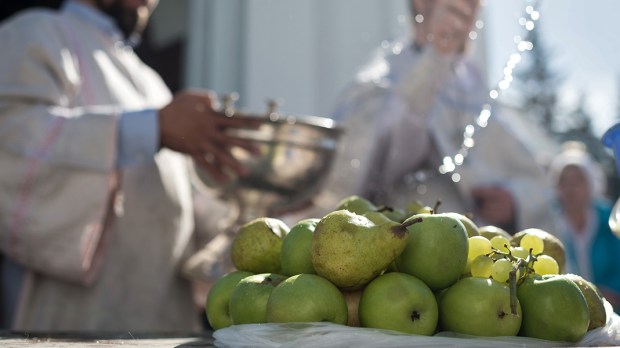The feast of the Transfiguration has been celebrated on August 6 since at least the 11th century, and along with it, a blessing of fruit was once observed by Roman Catholics and is still maintained by many Eastern Catholics today.
According to the medieval document known as The Golden Legend, “In some churches, on this day, the Blood of Christ is consecrated from new wine—when new wine can be made and is available—or at least a ripe grape is squeezed into the chalice. Also on this day clusters of grapes are blessed.”
While this tradition is primarily connected to harvest festivals that occur near the end of summer, it also has a spiritual connection to the Transfiguration.
The Golden Legend continues, “The reason for this is that the Lord, at the Last Supper, said to his disciples: ‘I shall not drink again of this fruit of the vine until that day when I drink it new with you in my Father’s kingdom.’ His transfiguration, and the new wine of which he spoke, represent Christ’s glorious renewal after his resurrection; and therefore it is on this feast of the transfiguration, which represents the resurrection, that new wine is called for.”
The Byzantine Archeparchy of Pittsburgh explains that, “The Christian practice to bless the fruits in church can be traced back to Apostolic times. The oldest prayer for the blessing of fruits is registered by the Apostolic Constitutions in the 4th century. But there is also an older Prayer of Thanksgiving for the new fruits in the work of St. Hyppolytus, the Apostolic Tradition, composed about 220. St. Hippolytus mentions the following fruits usually blessed: grapes, figs, pomegranates, pears, mulberries, peaches, and almonds. The sixth Ecumenical Council, celebrated in Constantinople (680-681), prescribed that the new “wheat and grapes” were to be blessed in church on the feast of the Holy Transfiguration (canon 28).”
Even though this tradition is not as widely celebrated as it once was, it reminds us to bring everything before God for his blessing, especially the first fruits of our harvest. It also highlights the spiritual connection between grapes, the Eucharist and the feast of the Transfiguration.
Here is the Byzantine blessing of fruit that occurs on this day.
O Lord our God Jesus Christ, You said to Your disciples: ”Whatever you ask for in prayer, believe that you shall receive, and it will come to you,” we humbly beseech You, bless and sanctify the fruits which your faithful servants have brought today to Your church. May these fruits when eaten preserve the life and health of all those present here, as well as of those absent. May these blessed fruits be an effective medicine for those who are sick and ailing, and may they be a protection against the assaults of enemy for those who keep them in their homes; and may those who partake of them enjoy the fullness of Your goodness and blessing. For You are the God of peace, love and mercy, O Lover of mankind, and we render glory to You, Father, Son, and Holy Spirit, now and ever, and forever. Amen.

Read more:
Here’s how to get your wine blessed on the feast of St. John

Read more:
The annual tradition of blessing herbs on the feast of the Assumption

